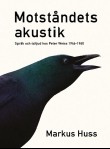onr:"swepub:oai:DiVA.org:su-102222"
Search: onr:"swepub:oai:DiVA.org:su-102222" > Motståndets akustik :
- 1 of 1
- Previous record
- Next record
- To hitlist
Motståndets akustik : Språk och (o)ljud hos Peter Weiss 1946–1960
-
- Huss, Markus, 1981- (author)
- Stockholms universitet,Institutionen för litteraturvetenskap och idéhistoria,Södertörns högskola,Litteraturvetenskap,Baltic & East European Graduate School (BEEGS)
-
- Holmgren, Ola, Professor (thesis advisor)
- Södertörns högskola,Litteraturvetenskap
-
- Olsson, Anders, Professor (thesis advisor)
- Stockholms universitet,Institutionen för litteraturvetenskap och idéhistoria,Stockholms universitet, Institutionen för litteraturvetenskap och idéhistoria
- show more...
- show less...
- (creator_code:org_t)
- ISBN 9789172473669
- Lund : Ellerströms förlag, 2014
- Swedish 304 s.
- Series: Södertörn doctoral dissertations, 1652-7399 ; 90
- Series: Eureka, ellerströms akademiska, 1652-7399 ; 43
- Doctoral thesis (other academic/artistic)
Abstract
Subject headings
Close
- This study explores how language is thematized in a selection of literary texts written in Swedish and German by Peter Weiss between 1946 and 1960. The textual interpretations seek to establish how Weiss’s literary work forms a multifaceted reflection on language and its cultural, historical and material preconditions. The various literary conceptualizations of language in Weiss’s texts are shown to be intimately linked to historical processes, where early postwar Germany plays a crucial role as a contextual framework. The study demonstrates how the texts explore an acoustic dimension of language, where non-articulatory sounds and noises oscillate between two poles: they either pose a threat to the narrator, or form a promise of a future emancipatory linguistic expression beyond a territorializing and violent language. Furthermore, the study argues that the sounds and noises permeating Weiss’s literary work form a soundtrack of past violence haunting the present. Finally, this soundtrack is shown to undermine a German postwar literary discourse that postulates a historical break after the Second World War (Stunde Null) as well as a new German literary language cleansed of Nazi contamination (Kahlschlag).The study draws its theoretical framework mainly from research concerned with mono- and multilingualism in literature, as well as from intermedial studies examining the interaction between literary texts and other artistic media such as the visual arts and music.The material examined in the study consists of six short stories in Swedish published between 1946 and 1953 in the literary journals 40-tal, Prisma and All världens berättare; the prose manuscript “Der Vogelfreie” (1947), later published as Der Fremde. Erzählung (1980); as well as the “micro novel” Der Schatten des Körpers des Kutschers (1960). Aside from these literary texts, Weiss’s documentary film Enligt lag (1957) and his feature film Hägringen (1959) are also analyzed.
Subject headings
- HUMANIORA -- Språk och litteratur -- Litteraturvetenskap (hsv//swe)
- HUMANITIES -- Languages and Literature -- General Literary Studies (hsv//eng)
Keyword
- Peter Weiss
- monolingualism
- multilingualism
- exile literature
- migration
- intermediality
- translation
- sounds
- noises
- Stunde Null
- Kahlschlag
- Stig Dagerman
- Gunnar Ekelöf
- enspråkighet
- flerspråkighet
- exillitteratur
- migration
- intermedialitet
- översättning
- ljud
- oljud
- Literature
- litteraturvetenskap
Publication and Content Type
- vet (subject category)
- dok (subject category)
Find in a library
- Motståndets akustik Språk och (o)ljud hos Peter Weiss 1946–1960 (Search the publication in LIBRIS)
To the university's database
- 1 of 1
- Previous record
- Next record
- To hitlist
Find more in SwePub
- By the author/editor
- Huss, Markus, 19 ...
- Holmgren, Ola, P ...
- Olsson, Anders, ...
- Grub, Frank Thom ...
- About the subject
-
- HUMANITIES
- HUMANITIES
- and Languages and Li ...
- and General Literary ...
- Parts in the series
- Södertörn doctor ...
- By the university
- Stockholm University
- Södertörn University
Search outside SwePub
- Extend your search to:
- Google Book Search
- Google Scholar
Kungliga biblioteket hanterar dina personuppgifter i enlighet med EU:s dataskyddsförordning (2018), GDPR. Läs mer om hur det funkar här.
Så här hanterar KB dina uppgifter vid användning av denna tjänst.
- Copyright © LIBRIS - National Library Systems
- LIBRIS.kb.se

